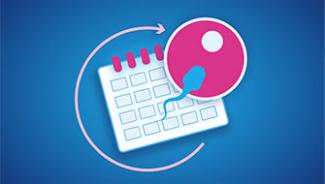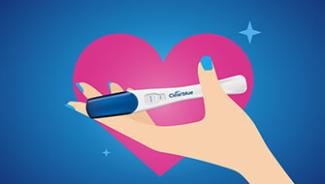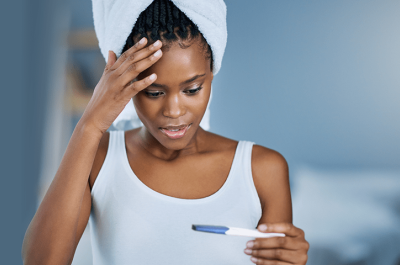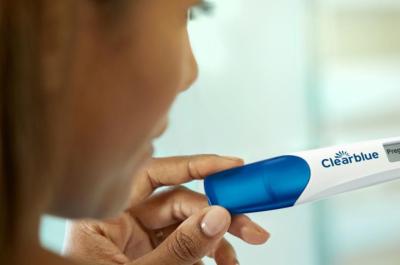When is the best time to take a pregnancy test?

Taking a pregnancy test is all about timing. And time can move oh-so-slowly when you’re anxious to know if you’re pregnant or not. It’s perfectly normal to have questions like, Can I take a pregnancy test in the middle of the afternoon? or I took a pregnancy test early this morning — can I take one again tonight? We’ve got some answers for you.
When is the best time to take a pregnancy test?
If you’re testing early, before your period is due, it’s best to test in the morning, using your first urine of the day.1 Pregnancy tests work by detecting the presence of the hormone human Chorionic Gonadotropin (hCG) in your urine, which is more concentrated in the morning.2 If you use an early-detection pregnancy test, detectable amounts of hCG can be found in your urine a few days sooner than your missed period. A Clearblue® Early Detection Pregnancy Test can detect 71% of pregnancies 6 days before the missed period.3
If you’ve already missed your period, you can test any time of the day as your hCG levels will be high enough to be detected. All Clearblue® pregnancy tests are more than 99% accurate from the day you expect your period.4
Can 12 hours make a difference in a pregnancy test?
Possibly, but it’s unlikely. It has everything to do with your hCG levels.
While hCG levels rise steadily and predictably in early pregnancy, those levels can also vary from person to person.5 Typically, the level of hCG doubles every two days during the first 10 weeks of pregnancy, peaking around week 10.6,7 Home pregnancy tests don’t detect the level of hCG, but the presence.2 To get a positive result, the level of hCG present in your urine must meet or exceed the sensitivity level for your specific pregnancy test.2
Now, if you are pregnant, at some point the amount of hCG in your urine will reach the point where it will meet or exceed the sensitivity level for your specific pregnancy test. And that point might just happen 12 hours from your last test. Because the level of hCG typically doubles every two days, 12 hours likely isn’t enough time to make a difference in your result. However, if you got a negative result the night before, you could get a positive result in the morning.
So, what should you do? Follow the timing instructions on your test. Not all tests will be the same. For example, if you used a Clearblue® Early Detection Pregnancy Test, the instructions say that if your test shows a negative result or you are not sure of the result, you may want to retest within the first week of a missed cycle. If you used a Clearblue® Digital Pregnancy Test with Smart Countdown, the instructions advise to test again in three days’ time. If the test gives you a ‘Not Pregnant’ result and your period is late, see your doctor.
Scenarios in which 12 hours might make a difference when taking a pregnancy test
If you want to save time and money, your best bet is to wait longer than 12 hours before taking another pregnancy test. But there are a couple of scenarios in which 12 hours might make a difference:
- Your hCG level just happens to cross over your test’s sensitivity threshold during that 12-hour time period. The problem? You have no way of knowing exactly when this will happen.
- You took your first pregnancy test incorrectly. Most home pregnancy tests are easy to use by design as long as you read and follow the instructions. But some things, such as drinking too much liquid before taking the test or using an expired test.
Imagine this scenario: It’s late at night and you can’t sleep. Your period is not quite due, but you can’t shake the feeling you might be pregnant. You grab a home pregnancy test stashed in a drawer and note that it’s expired. It’s not that expired, you think. Butterflies in your stomach, you read the instructions and ignore the bit about testing in the morning. It was a hot day, so you drank a lot of water throughout the day and evening. You test and wait. The result is negative.
So, would testing 12 hours later in this scenario make a difference? Maybe — especially if you use a nonexpired pregnancy test and your first morning urine. But it’s important to note that the passage of time isn’t the contributing factor — you’re just following the test’s instructions precisely the second time.
Can you take a pregnancy test at night?
Yes, but if you’re testing before the day of your missed period, it’s recommended to use your first morning urine. If you’re testing on or after the day of your missed period, you can take any Clearblue® pregnancy test at any time of day, including at night.
Bottom line: Sure, there will be some people who take a pregnancy test, get a negative result and then get a positive result 12 hours later. But this is often not the case. Even though waiting can be hard, your best bet is to save yourself some time and money by following the guidelines included with your test.
Related Articles
Sources
- U.S. Food & Drug Administration. Guidance of over-the-counter (otc) human chorionic gonadotropin (hcg) 510(k)s – guidance for industry and fda reviewers/staff. Updated July 2000. Accessed March 7, 2023. https://www.fda.gov/regulatory-information/search-fda-guidance- documents/guidance-over-counter-otc-human-chorionic-gonadotropin-hcg-510ks-guidance- industry-and-fda
- Mayo Clinic. Getting pregnant. Updated December 23, 2022. Accessed March 7, 2023. https://www.mayoclinic.org/healthy-lifestyle/getting-pregnant/in-depth/home-pregnancy- tests/art-20047940
- Clearblue® Early Detection Pregnancy Test provides early detection of the pregnancy hormone. 71% of pregnancies can be detected 6 days before the missed period (5 days before the expected period) and 94% of the pregnancies can be detected 5 days before the missed period (4 days before the expected period).
- Over 99% accurate at detecting typical pregnancy hormone levels. Note that hormone levels vary. See product insert.
- StatPearls [Internet]. Betz D, Fane K. Human chorionic gonadotropin. Updated August 8, 2022. Accessed March 7, 2023. https://www.ncbi.nlm.nih.gov/books/NBK532950/
- Office on Women’s Health, U.S. Department of Health & Human Services. Pregnancy tests. Updated February 22, 2021. Accessed March 7, 2023. https://www.womenshealth.gov/a-z-topics/pregnancy-tests
- Gnoth C, Johnson S. Strips of hope: accuracy of home pregnancy tests and new developments. Geburtshilfe Frauenheilkd. 2014;74(7):661-669. doi:10.1055/s-0034-1368589. Accessed March 7, 2023. https://www.ncbi.nlm.nih.gov/pmc/articles/PMC4119102/

When is the best time to get pregnant?
There are only a few days each cycle, around ovulation, when a woman is fertile. Knowing these days can maximise your chance of conceiving.

Find the right pregnancy test for you
Our range of pregnancy tests are especially designed to meet your individual needs, whether you need fast, early, or digital results or more information about your pregnancy.




